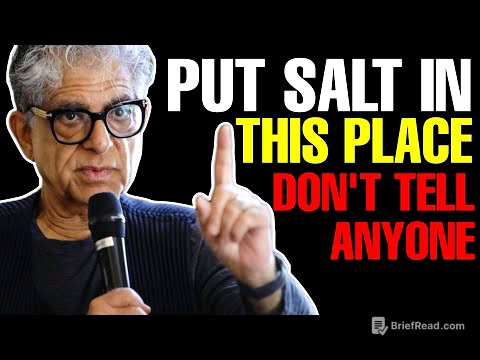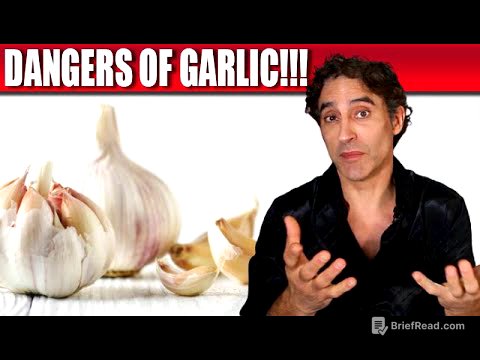TLDR;
Dr. Dan Maggs shares his personal journey from being an obese doctor to losing 66 pounds in six months and maintaining it. He highlights the role of insulin resistance in weight gain, a condition often overlooked by conventional weight loss advice. He emphasizes that weight loss is more about metabolic health than willpower and encourages viewers to determine if insulin resistance applies to them using a guide provided in the video description.
- Insulin resistance, caused by years of poor diet and lifestyle, prevents the body from accessing fat stores for energy.
- Conventional weight loss advice often fails because it ignores the hormonal reality of insulin resistance.
- Fixing metabolic health, rather than just focusing on calorie restriction, can lead to sustainable weight loss.
The Doctor's Weight Struggle and a Turning Point [0:00]
Dr. Maggs recounts his personal struggle with weight despite his medical knowledge. He was significantly overweight in his late 30s, despite trying to lose weight. In February 2016, during a ski trip in the French Alps, he observed a man putting butter in his coffee, which sparked his curiosity and led to a significant change in his understanding of weight loss.
The Irony of Giving Health Advice While Being Obese [1:51]
Dr. Maggs reflects on the irony of being an obese doctor giving health advice to patients. He understood the conventional "calories in, calories out" theory but couldn't apply it to himself. He recalls failing to lose weight for his wedding and feeling like a hypocrite when advising patients who claimed they were cutting calories without success.
The Revelation: Insulin as the Key to Fat Storage [3:30]
During the ski trip, the man who put butter in his coffee explained the role of insulin in weight gain. He highlighted that insulin is the fat storage hormone: when it's high, you store fat, and when it's low, you burn fat. Eating carbohydrates triggers insulin production, leading to fat storage. This realization made Dr. Maggs feel like he had missed something obvious despite his medical training.
Putting the Theory to the Test: Managing Insulin Levels [4:53]
Upon returning from the ski trip, Dr. Maggs decided to test the insulin theory by reducing his carbohydrate intake. Initially, he lost weight, but this time, unlike previous attempts, he didn't experience hunger or energy crashes. After six months, he lost 66 pounds and reached a normal BMI for the first time in his adult life. This success was attributed to addressing a hormonal issue rather than relying on willpower.
The Uncomfortable Truth: Metabolic Damage and Insulin Resistance [6:13]
Dr. Maggs explains that years of eating processed foods, snacking, and not exercising can lead to insulin resistance. In this condition, cells become less responsive to insulin, causing the pancreas to produce more of it. High insulin levels keep the body in fat storage mode, preventing access to stored energy and causing constant hunger. He argues that being overweight is often a sign of being metabolically unhealthy, which can be fixed.
Weight Loss as a Journey of Uncovering Deeper Issues [7:47]
Dr. Maggs emphasizes that weight loss is just the beginning of a journey. He describes it as peeling layers off an onion, with each layer revealing new issues to address, such as muscle weaknesses and poor habits. It took him years to put all the pieces together and reach a point where he no longer worries about his weight and enjoys exercise.
Shifting the Focus to Metabolic Health [9:10]
Dr. Maggs explains that his YouTube channel aims to help viewers understand and address these underlying issues more quickly. He advises starting by focusing on metabolic health rather than just weight loss. While not everyone who is overweight has insulin resistance, it is a major factor for many.
Detecting Insulin Resistance: Becoming a Health Detective [10:15]
Dr. Maggs notes that it's not possible to simply request an insulin resistance test from a doctor. Instead, he advises viewers to become detectives and look for clues. He offers a free guide on his website to help viewers determine if insulin resistance applies to them. He concludes by reiterating that weight loss is about fixing metabolic damage, not just exerting willpower, and that understanding the hormonal reality of insulin resistance is crucial.
![Doctor Reveals: How I Lost 68 lbs When Nothing Else Worked [Not Ozempic]](https://wm-img.halpindev.com/p-briefread_c-10_b-10/urlb/aHR0cDovL2ltZy55b3V0dWJlLmNvbS92aS9wSkFoel9KQUFKZy9tYXhyZXNkZWZhdWx0LmpwZw==.jpg)








